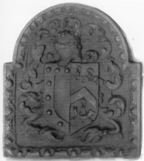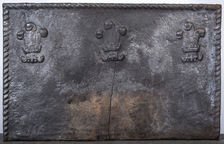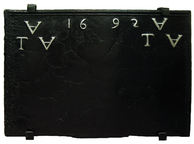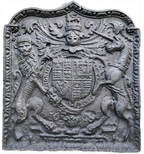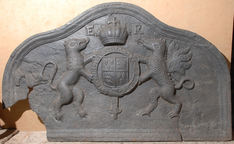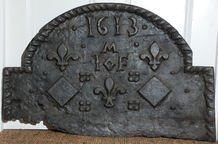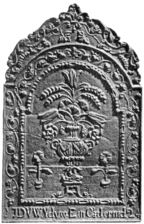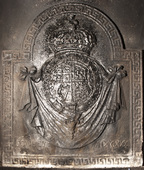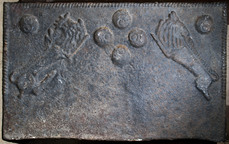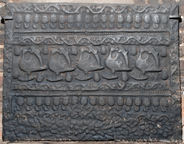-
898
Description: Arched rectangular; ovolo-moulded egg and dart edging; shield surmounted by helm and indistinct crest, with elaborate mantling.
Notes: Blazon (bordure bezanty impaling a chevron between three bugle horns) is unidentified. The date of c.1730 suggested by Gentle and Feild is unlikely to be correct.
Arms: Not known
- Decoration tags:
- rectangular with round arch (shape)
- ovolo, egg and dart (edging)
- whole carved pattern
- armorial
Manufactured: in the early- to mid-17th century in England.
Current location: not known.
- Attached to series:
- Personal armorial firebacks
-
1019
Description: Rectangular; twisted rope edging; top centre and corners, stamp formed of three ostrich feathers within a coronet, repeated three times.
Notes: The ostrich feathers are the badge of the Prince of Wales; a recast plate. Gildings Auctioneers, Market Harborough, 19 Apr 2016 lot 529.
- Decoration tags:
- rectangular (shape)
- rope (edging)
- carved stamps
- heraldic
- royal
- objects
Manufactured: in the early- to mid-17th century in England.
Current location: not known.
- Attached to series:
- Prince of Wales' feathers series
- Prince of Wales firebacks
-
302
Description: Rectangular; cyma reversa moulded edging (top and sides); top centre, date with central space; top corners, ‘A’ above ‘TA’, in all cases the ‘A’ is inverted.
Notes: The significance of the inverted ‘A’ is not known; possibly an example from a late 17th-century series which often includes a rose and crown stamp.
Inscription: A 16 92 A / TA TA
- Decoration tags:
- rectangular (shape)
- cyma reversa/ogee (edging)
- carved stamps
- individual letters
- individual numbers
- text
Manufactured: in 1692 in England.
Current location: Gillingham Museum, Gillingham, Dorset, England.
- Attached to series:
- Date & initials firebacks
-
1062
Description: Rectangular with ogee arch; ovolo, egg and dart edging; shield, garter, helm, mantling, crest and motto of the English House of Stuart; date split either side of garter buckle.
Notes: One of several firebacks, all of the same date, but varying in size, framing style and moulding; all have stylistic features in common and will have been the work of the same pattern maker, who was also responsible for carving royal coats of arms in three West Country churches. Similar in design but proportionately different to no. 880.
Copies of this fireback are known.
Inscription: HONI SOIT QVI MAL Y PENSE / 16 18
Arms: English Stuart royal (James I)
- Decoration tags:
- rectangular with ogee-arch (shape)
- ovolo, egg and dart (edging)
- whole carved pattern
- heraldic
- armorial
- text
Manufactured: in 1618 possibly in the Forest of Dean area of England.
Current location: not known.
-
303
Description: Rectangle with curved shoulders and low arch joined with concave curves; fillet and ogee moulded edging; central Tudor royal shield surrounded by garter, with crown above and lion and dragon supporters; royal initials either side of crown.
Notes: Damaged on bottom left corner; the garter motto includes ‘EQVI’ instead of ‘HONI’, making it meaningless; possibly ‘EQVI’ was a mis-transcription of ‘HONI’; the crown is distinctly continental in form; a much-copied fireback. Previously at Hoarthorns Farm, West Dean, Gloucestershire, where another fireback of the same design was recovered from a pond and is now at the Forestry Commission camp site at Christchurch, near Coleford.
Copies of this fireback are known.
Inscription: E R / EQVI : SOIT : QVI : MAL : Y : PENSE
Arms: Tudor royal - Edward VI or Elizabeth I
- Decoration tags:
- rectangular with round arch (shape)
- fillet and ogee (edging)
- whole carved pattern
- planklines
- armorial
- royal
- text
Manufactured: in the mid- to late-16th century in England.
Current location: Gloucester Folk Museum, Westgate street, Gloucester, Gloucestershire, England.
Museum number: GLRCM:F03526 (part of the Gloucester Museums museum group)
-
70
Description: Arched rectangular shape; simulated twisted rope edging (top & sides); symmetrical arrangement of fleurs de lys (two types - 2 and 1), diamond shapes (2) and cross-cut squares (4) includes the monogram in which the letters I and F are separated by a small, hollow diamond stamp, the M being above; interspersed symmetrical arrangement of raised spots (8).
Notes: The initials, as with other triple-lettered forms, in which the middle letter is set apart from the other two, may relate to a married couple where their surname initial is M. Another example seen has shown that the pattern was formed of five angular, uneven-sized planks battened together.
Copies of this fireback are known.
Inscription: 1613 / M / I F
- Decoration tags:
- rectangular with round arch (shape)
- simulated rope (edging)
- simple stamps
- carved stamps
- individual letters
- individual numbers
- planklines
- heraldic
- text
Manufactured: in 1613 in the Weald area of England.
Current location: Godalming Museum, Godalming, Surrey, England.
Museum number: B980.400 (part of the Godalming Museum museum group)
- Attached to series:
- Diamond series
-
858
Description: Arched rectangular shaped central panel, bead-and-pellet on fillet edging, narrow-necked, two-handled urn with flowers and wheat ears issuing therefrom, the vase resting on paving, upon which are two small flowers in pots with a stool between; arched rectangular shaped border with fillet edging and symmetrical floral tendrils, a looped 'W' in each shoulder; on top, mirrored leaves, tendrils and wheat ears; inscription along bottom of border.
Notes: One of the two largest of six flower vase designs in this series (see also no. 885). All incorporate the looped 'W' motif which may be intended to identify the pattern maker. The inscription translates as 'God is our strength'. Illustration from Goodwin-Smith, 1936 (from Bratt Colbran Ltd.'s (London) catalogue, in which copies of this fireback were advertised in the early-20th century).
Copies of this fireback are known.
Inscription: 17 DVW Ydyw Ein Cadernid 24
Manufactured: in 1724 in England.
Current location: not known.
Citation: Goodwin-Smith, R., 1936, 'Some English Firebacks', The Connoisseur, 97, pp. 36-8.
- Attached to series:
- 1724 series
- Welsh inscription series
- British 'Dutch' style firebacks
-
1292
Description: Arched rectangular shape; Greek Key border with fillet edges; in high relief, in front of swagged drapery, the shield of, quarterly, France quartering England, Scotland and Ireland, surrounded by a Garter, and surmounted by a ducal coronet; below, the inscription in capitals.
Notes: The use of the Greek Key design as a border is believed to be unique for an English fireback. Although somewhat indistinct, the use of the Stuart royal arms and the ducal coronet can be explained by the fact that the fireback was one of a group cast for the 2nd Duke of Richmond, whose father, the 1st duke, was the illegitimate son of Charles II and Louise de Kéroualle. The Richmond arms were differenced from the Stuart royal arms by the addition of a bordure compony (the detail of which is not distinct on this casting). Sowley Furnace, near Beaulieu in Hampshire, was owned in 1732 by John, 2nd Duke of Montagu, and was let to Miles Troughton. An identical fireback also at Goodwood is dated 1731 and a similar, but smaller, variant of this fireback, is dated 1732.
Copies of this fireback are known.
Inscription: HONI SOIT QUI MAL Y PENSE / SOWLEY MDCCXXX
Arms: Duke of Richmond
- Decoration tags:
- rectangular with round arch (shape)
- fillet (edging)
- whole carved pattern
- heraldic
- armorial
- royal
- text
Manufactured: in 1730 at Sowley Furnace, Beaulieu in the New Forest area of England.
Current location: Goodwood House, Westhampnett, West Sussex, England.
-
1207
Description: Rectangular; twisted rope edging (top and sides); in the upper part of the plate, between a leopard passant guardant sinister (on the left) and a leopard passant (on the right), a domed roundel bearing an off-centre smaller roundel within an edged circular depression, repeated four times in diamond pattern, with the smaller roundels orientated towards the centre of the arrangement; in the top corners, two more domed roundels, their smaller roundels orientated towards the bottom of the plate.
Notes: The roundel stamp has not been noted on any other firebacks. One of the legs of the leopard on the left and both legs of the leopard on the right are missing, suggesting that the stamps, which appear complete on many firebacks, were well used and had been damaged; this suggests a relatively late use of these stamps. Gorringe's auction, Lewes, lot 82, 2 Aug 2021 (£170). Bishop & Miller Auctioneers, Stowmarket, 27 Jan 2022, lot 383 (£2,900).
Copies of this fireback are known.
- Decoration tags:
- rectangular (shape)
- rope (edging)
- simple stamps
- carved stamps
- heraldic
- animals
- objects
Manufactured: in the mid- to late-16th century in the Weald area of England.
Current location: not known.
- Attached to series:
- Royal series
-
996
Description: Quasi-rectangular shape (42.5mm wider at the bottom); border formed of strips carved with an undulating vine (top and sides); successive rows of repeated stamps: (from top) 18 'hops' or 'grape bunches' in line, horizontal fillet with line of beads below, line of vine strips, 5 birds (probably swans, a Lancastrian badge) in line with 'hops'/'grape bunches' at top and bottom of gaps, line of vine strips, line of beads with horizontal fillet below, 17 'hops'/'grape bunches' in line, and line of vine strips (partially obscured by what appears to be the repeated pressing of finger tips into the casting sand to form an extension at the base).
Notes: One of a series of firebacks incorporating the use of the undulating vine strip, and the 'swan' stamp. Copies of this fireback were advertised in the Wayte & Cheverton (Edenbridge) catalogue in the early-20th century.
Copies of this fireback are known.
- Decoration tags:
- rectangular (shape)
- trailing vine (edging)
- simple stamps
- carved stamps
- heraldic
- animals
- plants
- objects
Manufactured: in the late-16th century possibly at Pounsley Furnace, Framfield in the Weald area of England.
Current location: in private hands, Goudhurst, Kent, England.
- Attached to series:
- Pounsley series
- Vine strip series
- Swan series
- Furniture stamp firebacks
